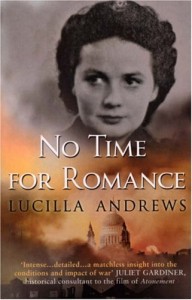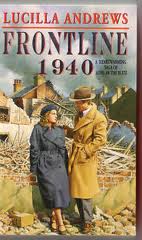A Prescient Author: Lucilla Andrews
This week I joined the Fulham Women’s Institute to talk about romantic fiction over the last 50 years. Predictably, a combination of lively questions and a (slight, very slight) tendency to beady-eyed obsessiveness on my part, bounced me off course into general appreciative splurge.
So I never told them, as I had meant to, about one of my heroines. I had a great time, but I’m afraid I short-changed them. This is an apology and an attempt to supply the deficiency of my talk.
Lucilla Andews died on October 3rd 2006. The Romantic Novelists’ Association had given her a lifetime achievement award barely two months earlier. She had sold getting on for 3 million books round the world. Drawing heavily on her own experiences as a nurse at St Thomas’s during the War, she became what the Guardian newspaper described as “the brand leader of hospital romance”. (Do you detect a hint of the patronising, perhaps?)
She was published in 11 languages. Her career spanned forty years. For the first ten years of Public Lending Right in the UK she was in the top 50 authors borrowed from Public Libraries. She wrote 35 novels and an autobiography, No Time for Romance, which is an unforgettable account of wartime from the point of view of one of the ordinary people whose lives were utterly transformed by it.
She was left the sole breadwinner by her husband’s illness very soon after marriage, when her only child was five months old. For the rest of her life she earned her living from writing. The books and short stories ensured that her daughter had a stable, loving and stimulating home – and the sort of education that Lucilla had not had herself. Veronica went to Cambridge, read history and became communications adviser to the Labour Party among others– a towering presence, according to her obituary in The Guardian. Veronica died in 2002. It must have been dreadful.
But when I saw her in Edinburgh, on the occasion of that Lifetime Award, Lucilla Andrews talked about Veronica’s achievements and the fun they had together, not the loss. She made it clear, too, that she, personally, was passionate but never doctrinaire about women’s rights. She had a right to be. She had, after all, paid her dues.
Her writing also made not inconsiderable amounts of money for publishers and agents, at various times. This, you would say, was a woman of energy and intelligence, of vision and some moral force. Was she listened to with respect?
She was not.
In 1955 she suggested to her publisher that it would be timely to make a television series based on her imaginary hospital St. Martha’s. A hospital was, she argued, a microcosm of society; it was full of drama as well as “humour, absurdites, incompatible temperaments and love affairs”. Her books were successful. Her writing skills were proven. Above all, her knowledge of the background was unrivalled. (She did not say this, you understand. She may have thought it was self evident, as it certainly should have been.) As she later said in her autobiography, she drew on her nursing experience “without falsification”. Her former colleagues on the Nursing Times, said that her novels were “faultless in their settings … stoical, spirited, humane.” Doesn’t sound trivial, does it?
Television needed drama. The time was surely right. So what happened, when she suggested her hospital series?
Flat rejection. Specifically, “Oh no dear, that may do for women’s magazines but it won’t do for television.” Men, you see, watched television. They would not be interested in little stories for women.
And then came . . . Dr Kildare; Emergency Ward Ten; Angels; blah, blah, blah … right up to our own day of Casualty; Grey’s Anatomy, Green Wing and dozens of others.
Did anyone ever say to her, “Sorry Lucy, you were right?”
Nope. Even though, according to a Harrap’s representative from the old days who made it to the Memorial Service, the office was waiting for her ms to arrive so that they could whisk it off to printing, with minimal editorial, to get it out there and earning. But they never thought she was worth listening to. It makes me so angry.
And these days she is largely forgotten, which is a waste. Her accounts of wartime, whether fictional or memoir, are electrifying. If you want to know what it was like to be a nurse in St Thomas’s during the Blitz, read Frontline 1940. The hero, an American journalist, has been present during the fall of Paris and he expects London to fall too. This is what it was like to expect to be defeated and hope to hang on for just one more day.
Please read it, Fulham WI and World. It’s worth it.


I read this and got angry all over again. And you don’t even mention Atonement!
Know what you mean, Lesley, but anger gets you nowhere, in the end. I’m just glad that she wrote and I’ve read her. She was a true original.
I wish I’d met her. No Time for Romance is an amazing book and she sounds an equally amazing person
I did meet her and she was tremendous, still very pretty (huge eyes) and immensely practical. She was in hospital, after a fall,very much bruised and shaken. She was 83, after all. And she was still looking round, beady-eyed, watching everything: you could see her mentally taking notes for the next book.
She was of a more robust age, with no concessions to political correctness too. ‘They have to sit at their desks taking notes all, the time,’ she said of the nurses, in ringing tones. ‘Not like it was in my day, when we were on our feet looking after patients all the time. We used to get terribly tired. Now they just get terribly fat. Poor dears.’ They must have heard her. I had the impression she had said it before. But you could see that the nurses liked her. With hindsight, I suppose also that they must have recognised (as I didn’t at the time but she must have) that she was dying and they deeply respected the spirit that kept on trucking, as long as there was breath in her body. A fantastic woman.
Wonderful post — the kind that makes you want to rush out and buy all her books and then make people read them.
Thank you Jenny. Some people ought not to be forgotten.
And have you ever thought of writing a biography of some of the amazing women who wrote romance? I, for one, would love it.
Brilliant to find others who appreciate that Lucilla Andrews’ books were not just romantic fiction but that they also opened a window onto the ideas and attitudes of a previous generation. In particular her auto biography is one of the best accounts of hoe the second world war affected the role and expectations of women and how it undermined the traditional boundaries of class; I used it when teaching GCSE history. I wish some-one would suggest publishing her novels on kindle; some of them arevery expensive second-hand.
I agree with everything you say about Lucilla as we kept in touch now and then. I love her books and agree with Jacky it would be great to see them on Kindle. In the meantime I have written an appreciation of Lucilla and published it on Kindle if anyone is interested. Let’s keep her name going.
I so agree with everything the previous writers have said, especially the point about getting the novels published on kindle. How does one get Amazon to publish books on kindle?
I found Lucilla’s books very real, as I started nursing in 1958. her descriptions of techniques were spot-on and her description of the humanity of patients/clients/customers and their carers was very true. her books provide a veritable history, albeit fictional account of nursing.
One day she might be the 20th century Bronte!
I’m so glad to hear that. She had many correspondents in the nursing profession. They were clearly important to her. Indeed, she kept photographs and letters from some of them until she died. She was very conscious of the need to be accurate — and especially not to give false hope to readers who might have sick relatives or be ill themselves. She wrote a thoughtful article for the Romantic Novelists’ Association (some time in the late 60s I think) about the need to keep her knowledge of medical developments and practice up-to-date and how she did it.
It would be great if she achieved a half the Brontes’s recognition. In my view, it would be well deserved.
A thoughtful and fascinating post about a respected and admired writer. Thank you, Jenny.
Thank you Christina. I can’t tell you how much I admire her.
I’ve just bought Frontline 1940 from Amazon marketplace, a clutch of copies there for only 1p + postage and packing.
Think you’re right. We forget that, like Waterloo, 1940 was a damn close run thing, invasion a real possibility. It must have been terrifying, yet so many of them did keep calm and carry on. A stoical generation.
I think they wiped it out afterwards. I suppose you’d have to, when the possibility of defeat receded from imminence but was, of course, always there. My mother, who was at the BBC at the time, said that there was only so much living on a knife edge that you could take. You got so tired, you decided to behave as if the worst wasn’t possible. She said afterwards she thought that it was collective and a bit mad but it helped your survival so you joined in.
I remember going to the Cabinet War Rooms and seeing a diary of one of the chaps down there (possibly Alan Brooke?) for the second week of September 1940 and one entry ends,’Will it be tonight?’ Chilled my blood, I can tell you.
She has been a favourite author of mine since my teenage years and I still have most of her books. The author of Atonement, Ian McEwan, acknowledges his debt to her here http://www.theguardian.com/uk/2006/nov/27/bookscomment.topstories3 her books were about real recognisable people, She was of my mother’s generation and the world she described fit exactly with that my mother told me about nurse training and nursing through the second world war. In fact her books helped me to understand my mother and her friends much more clearly.
How prescient of you, Helen. I didn’t realise that I would want to re-read so much and have only kept a couple!
not prescient, just a book hoarder of books I enjoy
This constantly azaems me just how blog owners such as your self can find the time as well as the dedication to keep on crafting superb blog posts. Your website is good and one of my personal must read weblogs. I just had to thank you.
Thank you, in turn. Your remarks are much appreciated